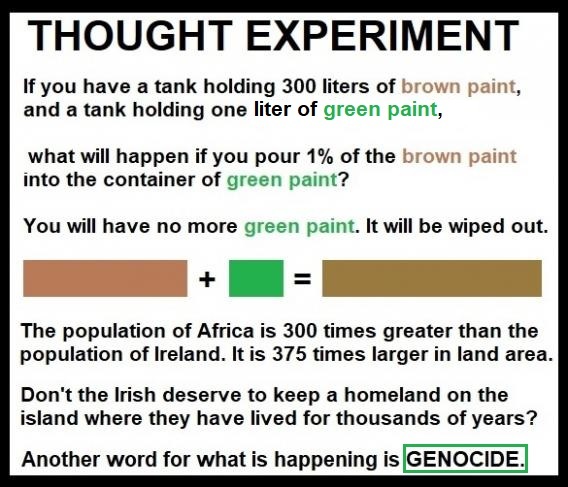Give a man a free house and he’ll bust out the windows – The Rainmakers, “Government Cheese”
Just a couple of days back, Matt Bracken posted the following graphic:

Apparently, there’s a mass migration of African Negroes to the Emerald Isle in progress. I wasn’t aware of it until recently. The graphic above states quite plainly what will become of the Irish should that migration be permitted to continue. It also asks a penetrating question:
That word “homeland” has undergone some twisting and stretching in recent years. Some folks use it to mean “where we originated;” some to mean “where we’ve been for centuries;” some to mean “where we want to be.” In the case of Ireland and its native-born population, the meaning is somewhere between the first and second usages: Ireland and Scotland exchanged large fractions of their populations long ago. Nevertheless, for at least a millennium, Ireland has been occupied by a people consistent in heritage and culture, overwhelmingly white and Christian.
The African diaspora (my fingers badly wanted to type “disaster” and very nearly succeeded) that has addressed the Emerald Isle, if permitted to continue, might overwhelm that native population completely. The numbers involved are convincing.
No First World nation that has allowed the mass immigration of African blacks has benefited by it. No land that has endured such an influx has not suffered. Heightened crime, social pathologies, and political turmoil always follow. Ireland will not be exempt.
Now let’s look at another homeland of interest: the nation of Israel.
The state of Israel was born shortly after World War II, in the region that constituted classical Judea and Samaria as they existed in the time of Christ. It was a bloody birth, though it needn’t have been so. The UN, aware that a mass of European Jews had migrated to the region after the war, decreed a partition of Palestine intended to create two nations: Israel and Transjordan (now just Jordan). The Arab / Muslim population of Palestine resisted unsuccessfully, and the rest is history.
The Jews who populated that new nation hadn’t “always lived there.” They hadn’t “lived there for centuries.” But it was where they wanted to be. Geographically, it was an element of their heritage and remained important to their religion. They established a Jewish state there by force of arms and have succeeded in holding it despite several attempts by neighboring states to eject them.
Even so, Israel many non-Jewish residents. In particular, the Arab / Muslim population of Israel is quite large: about 20% of the country’s population. Some of the troubles that have beset Israel have flowed from militant members of that fraction, with assistance from the surrounding Arab / Muslim states.
The Jews of Israel, and their supporters worldwide, maintain that Israel is the Jewish homeland and must be maintained and respected as such. While their claim has historical support, it’s dismissed by their neighbors and argued against by others worldwide.
So in one case, we have a native population that has been on the ground for many centuries, which is threatened by an influx of Africans. In the other, we have a population descended from a millennia-long diaspora, which partly displaced the residents and culture of that place about eighty years ago and established a wholly different social and political structure there. Yet both these lands are claimed as homelands by those who currently constitute their dominant culture. Given such a divergence of usages, is it possible to make something consistent out of the “homeland” argument?
Is there a coherent argument for ethnic homelands that would cover both cases? How about cases that aren’t yet “settled” in any sense? Do the Romany have a homeland? How about the Amerinds? What about populations that have colonized and conquered places far from their points of ethnic origin…such as the Euro-Caucasian settlers of North America?
There are a number of generally-agreed-upon homelands, conceded to their populations and kept safe from immigration. The Andaman Islands are one such. There are several communities in Northwestern Canada, Alaska, and the Aleutian archipelago, where entry is tightly restricted. But the homeland argument isn’t about those places and their peoples. It focuses on places that have been made desirable by one population and are now envied by others.
It’s an argument that won’t be settled in our lifetimes, if ever.
One final observation for the morning: Some years ago Israel officially conceded a large swath of the “West Bank” district to the Arab-Palestinian irredentists. The Jewish population was removed from the area, but left behind all the infrastructure and enterprise they had already built there. Within a few weeks, the greater part of that infrastructure and enterprise had been reduced to rubble and flinders by the new “owners.” They were crying poverty and demanding “aid” immediately thereafter.
Draw your own conclusions.
No one admits publicly, and hence public opinion does not admit, that ingratitude is the norm. It is astounding that countless benefactors allow themselves to be persuaded over and over that ingratitude with the resultant hatred is a rare and special case. — Helmut Schoeck















2 comments
Is there anywhere on this planet a free and independent nation created by black Africans and ruled by black Africans? A nation with prosperity and the order necessary for prosperity?
Ladies and gentlemen, I give you Haiti.
It comes down to the Y chromosome. If the men of the invaded country can be kept from passing along their Y chromosomes, that nation dies.
Genghis Khan passed along his genes to many in Asia – some say as many as 1 in 200 carry his genes.. All that need happen for this is for women to see an advantage in bearing children by the invaders.